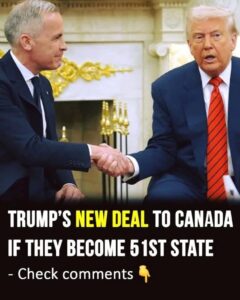
Trump Suggests Canada Could Join U.S. as 51st State in Exchange for Missile Defense
Former U.S. President Donald Trump has sparked new debate with a recent proposal involving America’s northern neighbor. In a Truth Social post on May 27, Trump suggested that Canada could join the United States as its 51st state if it wished to participate in his proposed “Golden Dome System,” a space-based missile defense network modeled after Israel’s Iron Dome.
The comments quickly drew attention in both countries, with political analysts noting that while the idea is unlikely to move forward, it highlights Trump’s unconventional approach to international relations as he campaigns for the 2025 presidential election.
The “Golden Dome” Proposal
At the center of Trump’s remarks is the “Golden Dome System,” which he describes as a space-based missile defense shield capable of detecting and neutralizing incoming threats. He has pledged that, if elected in 2025, the system would be developed and deployed before the end of his term.
Trump has repeatedly pointed to Israel’s Iron Dome as a model, emphasizing its effectiveness. However, he claims his version would be more advanced and could extend protection not only to the U.S. but also to allies willing to contribute financially.
According to Trump, Canada had expressed interest in the project. He argued that participation would come at a high financial cost for Canada unless the country chose to join the United States as a state—an option he said would provide missile defense coverage at “zero cost.”
Canada’s Response
Canadian officials have long rejected suggestions of statehood, and political leaders remain firm that the nation is committed to its sovereignty. Former Prime Minister Justin Trudeau previously stated that “Canada will never become the 51st state,” a sentiment echoed by current leadership.
So far, no official statement from Ottawa has indicated that Trump’s remarks reflect any real discussions between the two governments. Analysts widely view the comments as rhetorical and directed toward Trump’s political base rather than as a formal policy proposal.
Expert Analysis
Foreign policy specialists note that the idea of Canada joining the U.S. has little practical or political feasibility.
“Canada values its independence and has a strong national identity,” said Dr. Rachel Stone, professor of North American Studies at McGill University. “The notion of statehood has never been popular in Canada, and linking it to missile defense only underscores the transactional tone of Trump’s diplomacy.”
Experts also pointed out that Canada already cooperates closely with the U.S. on defense through NATO and NORAD (North American Aerospace Defense Command), both of which provide long-standing frameworks for joint security.
Public Reaction
On social media, Canadians responded with humor and skepticism. Hashtags such as #CanadaNotForSale and #51stState trended shortly after Trump’s post, with many users emphasizing national pride and independence. Some highlighted that while missile defense is valuable, sovereignty is not negotiable.
Historical Context
Over the years, occasional discussions—often symbolic or satirical—have touched on the idea of merging the U.S. and Canada due to shared geography and cultural ties. However, Canada has consistently guarded its independence. Its national identity is closely tied to values of multiculturalism, autonomy, and distinct political traditions.
For this reason, analysts argue that statehood is not a realistic option, regardless of external proposals.
Conclusion
Donald Trump’s suggestion that Canada could become the 51st U.S. state in exchange for inclusion in his proposed “Golden Dome System” is unlikely to move beyond rhetoric. While the remarks reinforce Trump’s image as a bold negotiator and attract attention during his campaign, Canada remains clear on its position: sovereignty is not for trade.
As the 2025 U.S. presidential election approaches, Trump’s unconventional ideas will continue to draw headlines. But when it comes to Canada, the nation’s stance remains firm—partnership, yes; statehood, no.





